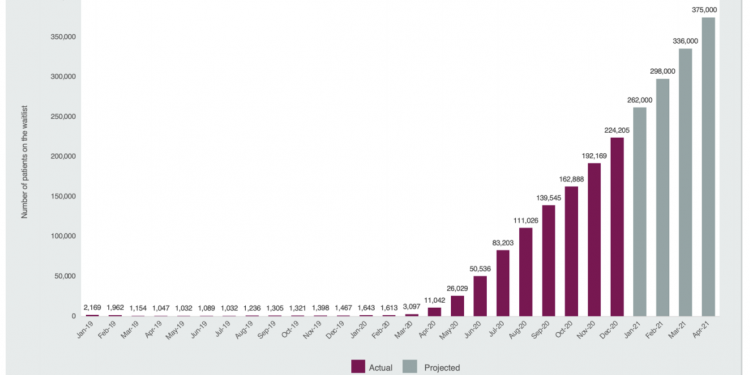There could be as many as ten million people on NHS waiting lists by April, thanks to a “ballooning” backlog of procedures caused by the response to the pandemic.
A report published by the influential think tank Reform shows that six million fewer patients were referred to treatment in 2020 than in 2019.
By April, 52-week waits for care are projected to have risen 12,008% since March 2020, after already rising by 7,139% by December.
The report, produced in conjunction with Edge Health, also shows that cancellations of diagnostic testing and delayed treatment is having a deadly impact on the nation’s health, resulting, for example, in an estimated 1,660 extra deaths from lung cancer alone.
The report states that a year into this crisis “and with the benefit of some hindsight”, it is clear that too little consideration was given to the implications of a complete reallocation of resources away from ‘business as usual’.
Reform think tank Director Charlotte Pickles that despite the efforts of frontline workers, the pandemic has “exposed weaknesses in the NHS model”.
Responding to a NHS White Paper, she said: “The Government is absolutely right to want to strengthen accountability, breakdown organisational barriers and boost financial sustainability. But while there is much to welcome in the White Paper, the measures are not sufficient to achieve these objectives.
“Real integration is hampered by misaligned funding models for primary, secondary and social care – something the White Paper says little on. Government is relying heavily on the proposed duty to collaborate, without tackling the financial disincentives to do so. And without a serious plan to fund social care, the system will remain inefficient and dysfunctional.
“Criticisms of a political ‘land grab’, however, are mistaken, the electorate expect to be able to hold the Government to account for NHS performance. But there is a big difference between setting priorities and taking operational decisions. Political interference in decisions about individual hospital closures or local service provision should be a cause for concern. These should be local decisions made by locally accountable bodies.”
The full report is available here.






